Kathleen Jones's Blog, page 66
July 16, 2012
Tuesday Poem: Brian Turner, Here Bullet
I've only recently discovered the work of US poet Brian Turner, and I've been completely knocked out by it.
Brian Turner served as a US soldier in the middle east and in the Bosnian war in Yugoslavia. Everything in these poems he has seen, heard or felt. The first collection Here Bullet comes from his active service, the second, Phantom Noise, from the trauma of trying to reintegrate into civilian life afterwards. This is war poetry on a par with Wilfred Owen and Keith Douglas.
Most impressive of all is the way that Brian Turner meshes his poetry with the poetry of the arab world, where poets have been writing about the conflict for a long time.
I've written more about his two collections on my book blog.
You can read six poems from the collection 'Here Bullet' on this link - all re-printed with permission
http://gocomics.typepad.com/the_sandbox/2009/02/here-bullet.html
For more wonderful poetry from around the world, take a look at the Tuesday Poem website and check out the sidebar where Tuesday Poets post their contributions.
Brian Turner served as a US soldier in the middle east and in the Bosnian war in Yugoslavia. Everything in these poems he has seen, heard or felt. The first collection Here Bullet comes from his active service, the second, Phantom Noise, from the trauma of trying to reintegrate into civilian life afterwards. This is war poetry on a par with Wilfred Owen and Keith Douglas.
Most impressive of all is the way that Brian Turner meshes his poetry with the poetry of the arab world, where poets have been writing about the conflict for a long time.
I've written more about his two collections on my book blog.
You can read six poems from the collection 'Here Bullet' on this link - all re-printed with permission
http://gocomics.typepad.com/the_sandbox/2009/02/here-bullet.html
For more wonderful poetry from around the world, take a look at the Tuesday Poem website and check out the sidebar where Tuesday Poets post their contributions.
Published on July 16, 2012 13:41
July 13, 2012
In the Land of the Great Grey Cloud
Well . . . that’s what England seems to be at the moment - it’s been non-stop rain (the odd sunny interval yesterday, billed as the Best Day of the Week) and grey gloom. The temperatures are low - 8 degrees overnight rising to a balmy 13 or 14 during the day. I’m told sales of St John’s Wort have spiraled since everyone’s suffering from Summer SAD syndrome.
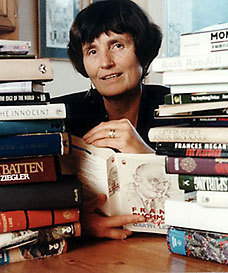
Not that I’ve been outside much since I got off the plane. I’ve been very busy raiding my bookcases in order to re-write and update a small book I wrote for the Arts Council a few years ago - ‘Margaret Forster: an introduction to her life and work’. Margaret has very generously given me the permission to update and re-publish. It was an interesting project at the time; one Cumbrian author writing about another. But we’re very different and our lives have followed different trajectories. Margaret was born in a city, before the war, won scholarships and went to Oxford; I was born in the wilds of the Cumbrian fells, after the war, and left school 3 weeks before my 16th birthday. Margaret went to London and began writing; I made a teenage marriage and traveled the world like a nomad. Margaret’s made a considerable name for herself, while I’ve plodded on at the bottom of the mid-list. But under the differences are common threads - we both come from families usually designated ‘working class’ and we’re rooted in northern culture. We’re both driven, and we care about writing very deeply.
Margaret’s life and her approach to writing and publication are fascinating - I’m always interested in the process of writing - the transformation of facts through the imagination into fiction - everything that happens before the finished product. And Margaret’s success is interesting to analyse since she has always refused to do any of the ‘performing author’ events that publishers insist you do to sell books (but she still sells shed-loads!). She has told me that once a book is published and out in the world she forgets about it and simply begins writing the next, putting all the others out of her mind completely. It sounds ideal, but for most of us, we’re tied into the exigencies of the publisher’s contract.
It’s a strange experience writing about a contemporary, particularly this blend of biography and litcrit. I’m thoroughly enjoying re-visiting her novels from the last few years, including the Orange listed ‘Over’, and hoping that the book will be available on Kindle and Smashwords around the beginning of September. Neil’s designing a really good cover. Watch this space!


Not that I’ve been outside much since I got off the plane. I’ve been very busy raiding my bookcases in order to re-write and update a small book I wrote for the Arts Council a few years ago - ‘Margaret Forster: an introduction to her life and work’. Margaret has very generously given me the permission to update and re-publish. It was an interesting project at the time; one Cumbrian author writing about another. But we’re very different and our lives have followed different trajectories. Margaret was born in a city, before the war, won scholarships and went to Oxford; I was born in the wilds of the Cumbrian fells, after the war, and left school 3 weeks before my 16th birthday. Margaret went to London and began writing; I made a teenage marriage and traveled the world like a nomad. Margaret’s made a considerable name for herself, while I’ve plodded on at the bottom of the mid-list. But under the differences are common threads - we both come from families usually designated ‘working class’ and we’re rooted in northern culture. We’re both driven, and we care about writing very deeply.
Margaret’s life and her approach to writing and publication are fascinating - I’m always interested in the process of writing - the transformation of facts through the imagination into fiction - everything that happens before the finished product. And Margaret’s success is interesting to analyse since she has always refused to do any of the ‘performing author’ events that publishers insist you do to sell books (but she still sells shed-loads!). She has told me that once a book is published and out in the world she forgets about it and simply begins writing the next, putting all the others out of her mind completely. It sounds ideal, but for most of us, we’re tied into the exigencies of the publisher’s contract.
It’s a strange experience writing about a contemporary, particularly this blend of biography and litcrit. I’m thoroughly enjoying re-visiting her novels from the last few years, including the Orange listed ‘Over’, and hoping that the book will be available on Kindle and Smashwords around the beginning of September. Neil’s designing a really good cover. Watch this space!
Published on July 13, 2012 14:30
July 9, 2012
Tuesday Poem: Leaving
By the time you read this I'll be on yet another plane or possibly a train, heading back to a very soggy northern England for a few days of hectic problem-solving, as well as the funeral of a very close friend. All this displacement from one country to another, week after week, creates a kind of time-shift in your head and sometimes your whole life seems unreal - one of those deja-vu experiences. I wrote this attempt to capture the feeling on a bus somewhere on the border between Poland and Slovakia last week.
Leaving
....... isn't easy. This non-stop journey
that your life's become, the suitcase
waiting on the bed, the post-it notes;
switch off, pull out the plugs, the TV
aerial, turn off the heating, taps,
dump rubbish, water the plants, push
keys through a letter box, and leave behind
a room un-tenanted, you might
one evening return to, whose stale
scent echoes in your memory
as soon as you re-open the door,
no bread, sour milk in the fridge,
dried petals on the table from the bare
stalks of the roses you forgot to throw,
the unfamiliar furniture, the closed books
with their backs towards this stranger
eavesdropping on a former existence.
© Kathleen Jones 2012
Please take a look at what the other Tuesday Poets are posting at the Tuesday Poem hub. A wonderful variety of poetry from around the world.
Leaving
....... isn't easy. This non-stop journey
that your life's become, the suitcase
waiting on the bed, the post-it notes;
switch off, pull out the plugs, the TV
aerial, turn off the heating, taps,
dump rubbish, water the plants, push
keys through a letter box, and leave behind
a room un-tenanted, you might
one evening return to, whose stale
scent echoes in your memory
as soon as you re-open the door,
no bread, sour milk in the fridge,
dried petals on the table from the bare
stalks of the roses you forgot to throw,
the unfamiliar furniture, the closed books
with their backs towards this stranger
eavesdropping on a former existence.
© Kathleen Jones 2012
Please take a look at what the other Tuesday Poets are posting at the Tuesday Poem hub. A wonderful variety of poetry from around the world.
Published on July 09, 2012 09:00
July 7, 2012
Bat Cat's Last Kitten
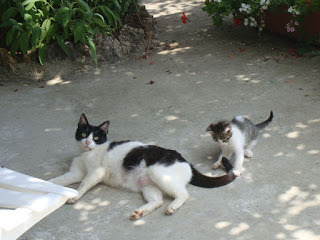
A couple of weeks ago I posted about having to bring back the last kitten from the market because no one wanted her. Although we loved her (she's so cute!) we didn't feel it was fair to keep her because we simply don't know how long we'll be able to stay here - a kitten is a long-term option - and we're away such a lot. No problem for a wild cat who lives outside and simply needs food left out for her, but a tame house cat is another thing altogether.
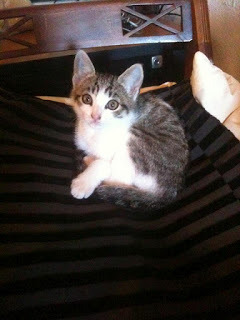 Newly named BiscaSo, we were very happy when our friends at Peralta offered to take the kitten and introduce her into the Peralta zoo which already includes two cats and three dogs. It also means that Neil and I can see her on a regular basis. She will have to earn her keep as a huntress, but she has her mother's genes and is a lively, feisty little cat. She's now named Bisca - a biscarina is an affectionate term meaning something like 'silly little girl' - and is a good description of a kitten who will chase anything and play with anything all day long. She's got the dogs under her paw already.
Newly named BiscaSo, we were very happy when our friends at Peralta offered to take the kitten and introduce her into the Peralta zoo which already includes two cats and three dogs. It also means that Neil and I can see her on a regular basis. She will have to earn her keep as a huntress, but she has her mother's genes and is a lively, feisty little cat. She's now named Bisca - a biscarina is an affectionate term meaning something like 'silly little girl' - and is a good description of a kitten who will chase anything and play with anything all day long. She's got the dogs under her paw already.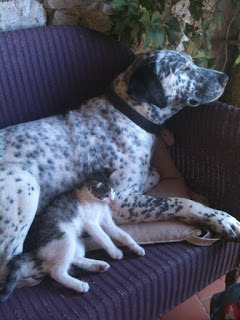 Friends!
Friends!Bat Cat, within days of losing her last offspring, was in an interesting condition when we came back from Slovakia and we were kept awake for two nights by the yowling and wowling of her boyfriends on the terrace. But I had already booked her into the wild cat trust's sterilisation programme. Catching her proved to be a bit of a game, particularly as she had her mind more on sex than on food. But cats in season get much more friendly and I managed to get near enough to grasp her by the scruff of the neck. Neil wrapped her quickly in a towel and we popped her unceremoniously into the laundry room for the night. Next morning I (being a farmer's daughter!) got the job of catching her in a confined space while Neil held the box. It was, as they say in Italy 'un casino'!! Cat on the shelves, Cat up the wall, Cat under the tool box. But finally she tried to go through the laundry rack, was trapped and caught. Phew..... One very unhappy cat. My heart bled for her, but I had to keep telling myself it was for her own good in the long term.
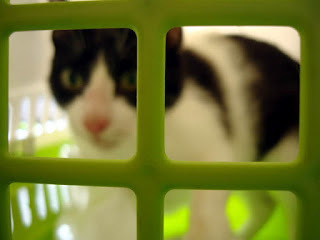 In the cat carrier It felt like delivering her into the hands of the feline equivalent of a backstreet abortionist! The instructions were to drive to a certain roundabout, and wait at the traffic lights for a woman in a red car. The cat was duly handed over and I was told to come back at 2 o'clock. Same roundabout, same traffic lights, same red car. Dozy post-operative cat handed back. Mission accomplished. I can't thank the Nati Liberi charity enough and was more than happy to pay for the operation. We kept her in the laundry room for 24 hours and she is now out, walking rather stiffly, but well and eating again. No more kittens. Feels a little sad, but it's the right thing to do. Wild cats can have two or three litters every year - every one of which can start breeding at 6 months and do the same. That's ten kittens a year for every cat..........
In the cat carrier It felt like delivering her into the hands of the feline equivalent of a backstreet abortionist! The instructions were to drive to a certain roundabout, and wait at the traffic lights for a woman in a red car. The cat was duly handed over and I was told to come back at 2 o'clock. Same roundabout, same traffic lights, same red car. Dozy post-operative cat handed back. Mission accomplished. I can't thank the Nati Liberi charity enough and was more than happy to pay for the operation. We kept her in the laundry room for 24 hours and she is now out, walking rather stiffly, but well and eating again. No more kittens. Feels a little sad, but it's the right thing to do. Wild cats can have two or three litters every year - every one of which can start breeding at 6 months and do the same. That's ten kittens a year for every cat..........
Published on July 07, 2012 04:15
July 5, 2012
Reading My Mother's Reading Diaries
It's the 5th of the month and I'm blogging over at
Authors Electric
about the reading diaries my mother kept for almost 60 years, from 1948 until she died. They're a fascinating record of the books she enjoyed and the changing fashions in literature. They were also a poignant reminder of a lovely woman who just happened to be my mother.
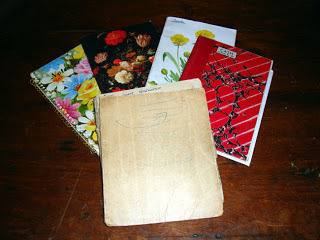 "I sporadically keep a log of what I read. I always start off with good intentions, write them all down for a few weeks and then get caught up in other things, leaving the pages blank. Only a few out of the thousands of books I’ve read since I left school have been recorded. But, when my mother died a few years ago I discovered among her things a series of little notebooks that were a record of her reading from 1948 until the week before she died, with very few gaps. She was a voracious reader and had a book in her hand when she slipped into her last coma......."
Read More .....
"I sporadically keep a log of what I read. I always start off with good intentions, write them all down for a few weeks and then get caught up in other things, leaving the pages blank. Only a few out of the thousands of books I’ve read since I left school have been recorded. But, when my mother died a few years ago I discovered among her things a series of little notebooks that were a record of her reading from 1948 until the week before she died, with very few gaps. She was a voracious reader and had a book in her hand when she slipped into her last coma......."
Read More .....

 "I sporadically keep a log of what I read. I always start off with good intentions, write them all down for a few weeks and then get caught up in other things, leaving the pages blank. Only a few out of the thousands of books I’ve read since I left school have been recorded. But, when my mother died a few years ago I discovered among her things a series of little notebooks that were a record of her reading from 1948 until the week before she died, with very few gaps. She was a voracious reader and had a book in her hand when she slipped into her last coma......."
Read More .....
"I sporadically keep a log of what I read. I always start off with good intentions, write them all down for a few weeks and then get caught up in other things, leaving the pages blank. Only a few out of the thousands of books I’ve read since I left school have been recorded. But, when my mother died a few years ago I discovered among her things a series of little notebooks that were a record of her reading from 1948 until the week before she died, with very few gaps. She was a voracious reader and had a book in her hand when she slipped into her last coma......."
Read More .....
Published on July 05, 2012 09:27
July 4, 2012
A Year in Italy
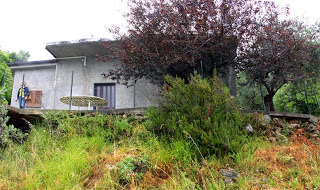 The house as we first saw itIt's exactly a year since we moved into our little olive house in Capezzano Monte - I can hardly believe it! Fortunately our landlady, Maria Louisa, is willing to let us have it for another year. Although it's very small, the main advantages (apart from hardly any housework!) are the peace and quiet and the wonderful views of the Mediterranean with the olive grove and chestnut woods falling away like a dark shadow beneath us.
The house as we first saw itIt's exactly a year since we moved into our little olive house in Capezzano Monte - I can hardly believe it! Fortunately our landlady, Maria Louisa, is willing to let us have it for another year. Although it's very small, the main advantages (apart from hardly any housework!) are the peace and quiet and the wonderful views of the Mediterranean with the olive grove and chestnut woods falling away like a dark shadow beneath us. 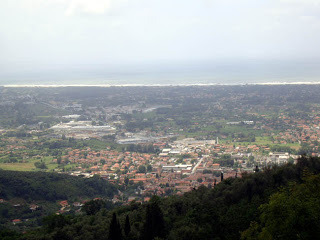
We are very lucky and I'm trying to repay my good fortune by doing as much writing as I can, though the temptation just to loll about on the terrace with a book in one hand and a glass of wine in the other is sometimes irresistible. We've now been here through all the seasons and in July the weather is getting very hot (touching 40 the other day) and the olive grove which, a couple of weeks ago was waist high in grass and wild flowers, has begun to look like a desert. It's the fire-risk season and the owners are obliged to strim the grass as a precaution. Having had a wild fire within a few hundred yards of the house last year we can understand the need. But it's hard not to regret the loss of the flowers - though most would have died from the drought anyway. It probably won't rain again now until the beginning of September.
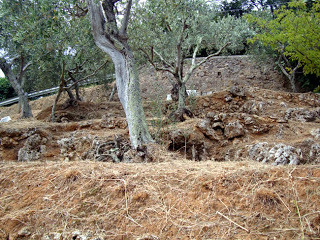
The main change here is that Neil has built himself a little hut - just a roof on posts with cane blinds around two sides - to use as a studio. In just a couple of weeks it's gone from this -
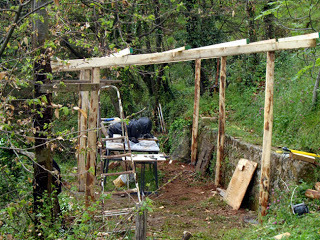 To this - I'm told the proper name for it is a Man-Cave!
To this - I'm told the proper name for it is a Man-Cave!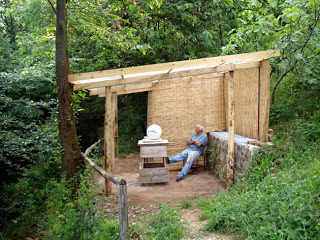 So tonight we will be having a drink to celebrate our year in Capezzano Monte and hoping for another year here in what is almost paradise - fingers crossed!
So tonight we will be having a drink to celebrate our year in Capezzano Monte and hoping for another year here in what is almost paradise - fingers crossed!
Published on July 04, 2012 07:03
July 2, 2012
The Last Day - a trip to Crakow
We've had a fantastic few days - a real indulgence for book-aholics and lovers of Mansfield and Woolf. But now it's time to leave and our final day is a trip to Crakow. We left Slovakia by coach - a little like a school outing!
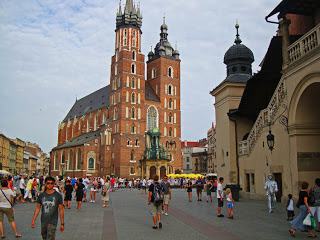
This beautiful Polish city was the birthplace of Katherine Mansfield's lover Floryan Sobieniowski and there's always been a lot of argument about whether she visited it or not while she was staying in Germany. As Katherine destroyed all her letters and notebooks from this period, it's impossible to be certain. But she was a big fan of one of Poland's most famous writers and artists - Stanislaw Wyspianski - and there may be clues to be found in some of the things she wrote about him.
This is the church, painted and decorated by Wyspianski - St Francis in the centre of Crakow. It has wonderful stained glass windows designed by Wyspianski.
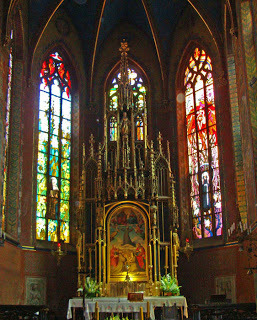
One of them is called 'To God the Father' which just happens to be the title of a poem written by Katherine Mansfield. If you read it in front of the window, it seems to be a description of the image - so, could she have seen it before she wrote the poem? It's tempting to think so.
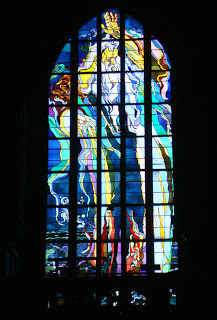
Cracow was full of folk dance troupes from all over eastern europe and beyond - Latvia, Russia, Turkey, Macedonia - we lost count. Even though it was over 35 degrees in the central square everyone was dancing and we hugged the shade of an archway to watch.
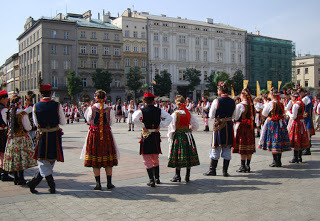
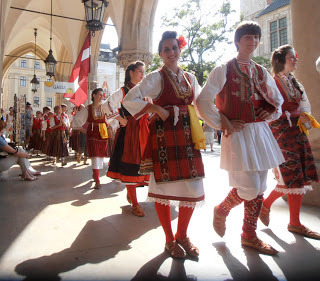
There was no time to visit the Schindler museum or the old Jewish ghetto made famous by the book and the film. We'll have to reserve that for another visit. Just time to have a meal in one of the many restaurants before heading for the airport and a flight to Milan. We drove home through the early hours, arriving about 4.30am. Now good for nothing at all except sleep. Sadly Italy lost out to Spain in the European cup - football in Italy seems as much of a shambles at the moment as it does in England. But they move so beautifully - it really is the beautiful game in Italy.

This beautiful Polish city was the birthplace of Katherine Mansfield's lover Floryan Sobieniowski and there's always been a lot of argument about whether she visited it or not while she was staying in Germany. As Katherine destroyed all her letters and notebooks from this period, it's impossible to be certain. But she was a big fan of one of Poland's most famous writers and artists - Stanislaw Wyspianski - and there may be clues to be found in some of the things she wrote about him.
This is the church, painted and decorated by Wyspianski - St Francis in the centre of Crakow. It has wonderful stained glass windows designed by Wyspianski.

One of them is called 'To God the Father' which just happens to be the title of a poem written by Katherine Mansfield. If you read it in front of the window, it seems to be a description of the image - so, could she have seen it before she wrote the poem? It's tempting to think so.

Cracow was full of folk dance troupes from all over eastern europe and beyond - Latvia, Russia, Turkey, Macedonia - we lost count. Even though it was over 35 degrees in the central square everyone was dancing and we hugged the shade of an archway to watch.


There was no time to visit the Schindler museum or the old Jewish ghetto made famous by the book and the film. We'll have to reserve that for another visit. Just time to have a meal in one of the many restaurants before heading for the airport and a flight to Milan. We drove home through the early hours, arriving about 4.30am. Now good for nothing at all except sleep. Sadly Italy lost out to Spain in the European cup - football in Italy seems as much of a shambles at the moment as it does in England. But they move so beautifully - it really is the beautiful game in Italy.
Published on July 02, 2012 13:26
July 1, 2012
Beware of the Bears (and the bad Barons)
Neil's been doing quite a bit of walking on forest paths and up on the hills while I've been listening to the delegates at the conference. It was quite a surprise to come upon a notice that warned about encounters with European brown bears because we had no idea there were any in the woods around our accommodation. There was even one of these warnings in the parking lot.
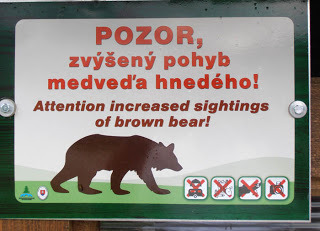
Another notice instructed us to keep calm when faced with a bear - not to make eye contact, and to back away slowly. Not sure I'd be able to comply with that! There's a stuffed brown bear in the museum here and, as you can see below, they are BIG. I don't think any of us had realised that middle europe is so wild. Apparently the Tatra mountains we drove through on our first evening were the setting for the early vampire film 'Nosferatu'.

Today's conference was mainly about translating Katherine Mansfield and, as we're surrounded by former Soviet bloc countries, much of it was about the politics of literature. In some cases, sentences were added to some of the stories to provide a strong moral direction or to give a different gloss. Some of the problems of translation relate to the fact that a lot of European languages are 'gendered' and so you can never have an anonymous narrator - they have to be either male or female. One of KM's most popular stories over here was 'A Cup of Tea' which features a rich, privileged woman picking up a young homeless girl who is begging. She takes her home, promising to give her a new life. Unfortunately, all the woman's benevolence goes out of the window when her husband remarks on how pretty the girl is and she is quickly sent back onto the streets.
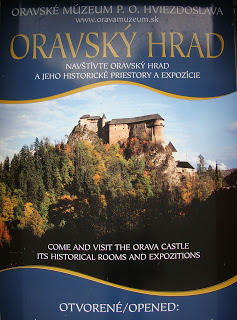
In the afternoon we were taken to visit a fairytale castle 'Orava', which was only a fairytale for the rich and powerful people who owned it. For the peasants who made their lives possible it was a nightmare. Orava Castle was one of the locations used for the film Nosferatu and you can't help thinking that it was perfect!
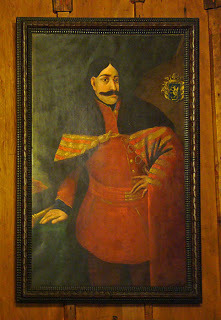
This is Count Nickolaus Draskovics of the Bad Hand (indicated by the Eagle motif in the corner of the painting), one of the first owners.
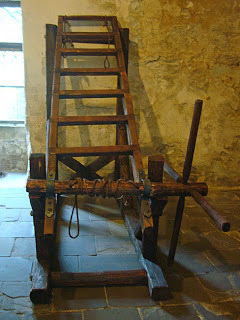
And this is his torture chamber complete with rack. There were also implements to string people up by their wrists and other unspeakable devices.
There were some nice touches - such as the maid's bedroom opening off the dining room where the nobles did their late night carousing. And the terrace where people were executed by being thrown from the battlements several hundred feet up.
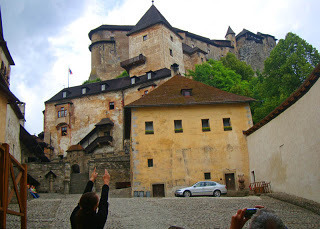
In the evening we were taken to a hotel deep in the forest for dinner and the first showing of a short film - A Cup of Tea - made by a very young Ukrainian film maker - Svitlana Topor - and an equally young film director, who were both there to talk to us about the project. It was a 'no budget' film, with actors working for nothing and everything begged or borrowed. The film makers are now trying to raise funds for post-production so that they can submit the film to festivals around Europe. They were both very talented and I hope they succeed.

Another notice instructed us to keep calm when faced with a bear - not to make eye contact, and to back away slowly. Not sure I'd be able to comply with that! There's a stuffed brown bear in the museum here and, as you can see below, they are BIG. I don't think any of us had realised that middle europe is so wild. Apparently the Tatra mountains we drove through on our first evening were the setting for the early vampire film 'Nosferatu'.

Today's conference was mainly about translating Katherine Mansfield and, as we're surrounded by former Soviet bloc countries, much of it was about the politics of literature. In some cases, sentences were added to some of the stories to provide a strong moral direction or to give a different gloss. Some of the problems of translation relate to the fact that a lot of European languages are 'gendered' and so you can never have an anonymous narrator - they have to be either male or female. One of KM's most popular stories over here was 'A Cup of Tea' which features a rich, privileged woman picking up a young homeless girl who is begging. She takes her home, promising to give her a new life. Unfortunately, all the woman's benevolence goes out of the window when her husband remarks on how pretty the girl is and she is quickly sent back onto the streets.

In the afternoon we were taken to visit a fairytale castle 'Orava', which was only a fairytale for the rich and powerful people who owned it. For the peasants who made their lives possible it was a nightmare. Orava Castle was one of the locations used for the film Nosferatu and you can't help thinking that it was perfect!

This is Count Nickolaus Draskovics of the Bad Hand (indicated by the Eagle motif in the corner of the painting), one of the first owners.

And this is his torture chamber complete with rack. There were also implements to string people up by their wrists and other unspeakable devices.
There were some nice touches - such as the maid's bedroom opening off the dining room where the nobles did their late night carousing. And the terrace where people were executed by being thrown from the battlements several hundred feet up.

In the evening we were taken to a hotel deep in the forest for dinner and the first showing of a short film - A Cup of Tea - made by a very young Ukrainian film maker - Svitlana Topor - and an equally young film director, who were both there to talk to us about the project. It was a 'no budget' film, with actors working for nothing and everything begged or borrowed. The film makers are now trying to raise funds for post-production so that they can submit the film to festivals around Europe. They were both very talented and I hope they succeed.
Published on July 01, 2012 04:19
June 29, 2012
Slovakia - a literary landscape
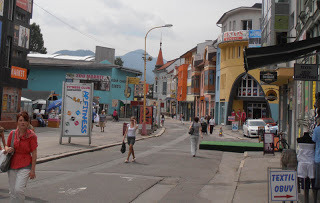 Our first day at Ruzomberok - a very bright, modern university in a small rural town.
Our first day at Ruzomberok - a very bright, modern university in a small rural town.Ruzomberok is surrounded by hills and forests and is a ski resort in the winter. It has a lovely collection of art deco buildings lining colourful streets. There's not much money here and it was quite interesting browsing the fashion shops - not a Benetton in sight!
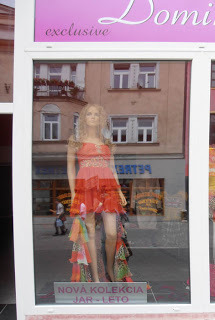
The bars are very colourful too! Being a Leo I couldn’t resist this one. The beer is cheaper than anywhere else in Europe.
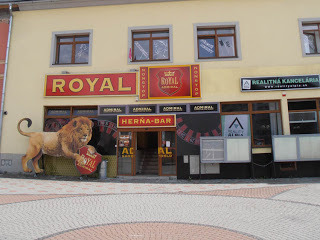
At the Katherine Mansfield Conference there were some very enjoyable talks. It’s called ‘Katherine Mansfield and Continental Europe’ and focuses on her European context. KM lived in Germany, Italy, Switzerland and France at various times, had a love affair with a Pole, and even began to learn his language in order to translate his literary idols. One of her best friends, Samuel Koteliansky was a Russian and she collaborated on translations of Russian writers with him.
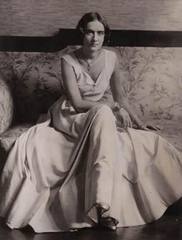 Elizabeth von Arnim (Countess Russell)
Elizabeth von Arnim (Countess Russell)KM’s cousin was the Countess Elizabeth von Arnim, best selling author of ‘Elizabeth and her German Garden’, and a novel still available called 'Enchanted April'. We had an interesting talk by Jennifer Walker, who’s writing a new biography. Elizabeth later become the Countess Russell, Bertrand Russell’s sister-in-law and was at the centre of literary life in Europe. She and Katherine had an uneasy relationship.
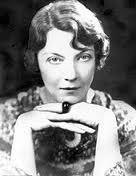 Jean RhysThe scholar Angela Smith (all the way from Stirling in Scotland) talked about Katherine Mansfield and Jean Rhys - their similarities and correspondences. I’ve always loved ‘Wide Sargasso Sea’ and ‘Good Morning Midnight’, but never thought of those books with such close reference to Mansfield. Rhys and Mansfield were both exiles, expatriates living in France, both had problems of identity, were sexually adventurous. But they were very different characters and Katherine’s fatal illness gave her writing a darker undertow.
Jean RhysThe scholar Angela Smith (all the way from Stirling in Scotland) talked about Katherine Mansfield and Jean Rhys - their similarities and correspondences. I’ve always loved ‘Wide Sargasso Sea’ and ‘Good Morning Midnight’, but never thought of those books with such close reference to Mansfield. Rhys and Mansfield were both exiles, expatriates living in France, both had problems of identity, were sexually adventurous. But they were very different characters and Katherine’s fatal illness gave her writing a darker undertow.That’s the wonderful thing about events like this, discovering the links between writers, the subtle cross-referencing and borrowing we all indulge in. An interesting talk by American scholar Sydney Janet Kaplan, proposed links between a KM story ‘The Escape’ and TS Eliot’s first wife Vivienne. TSE may even have borrowed his title ‘The Hollow Man’ from Katherine’s story. Her portrayal of his neurotic wife may well have caused the rift between them - causing TSE to refer to KM as ‘a dangerous woman’.
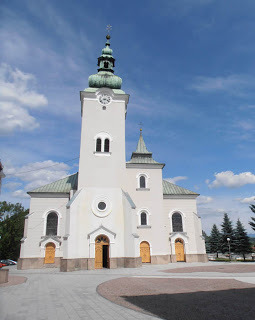 One of the beautiful churches hereWe’ve been beautifully fed all day - Virginia Woolf said that the mind doesn’t function well unless there is good food and wine to feed the flame at the base of the spine. Slovakian hospitality is unbelievably generous. We have also been introduced to Slovakian Pear Bandy - Kruski - which is dangerously delicious!
One of the beautiful churches hereWe’ve been beautifully fed all day - Virginia Woolf said that the mind doesn’t function well unless there is good food and wine to feed the flame at the base of the spine. Slovakian hospitality is unbelievably generous. We have also been introduced to Slovakian Pear Bandy - Kruski - which is dangerously delicious!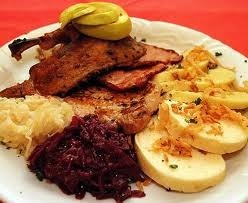
We finished the day in front of the world cup on TV - a great antidote to too much thinking! Tomorrow we're being taken to a spectacular castle. I'm exhausted and excited at the same time.
Published on June 29, 2012 09:54
June 27, 2012
Three Countries in One Day
Breakfast in Italy, lunch in Poland, dinner in Slovakia - it sounds like an entry from Rebekah Brooks' diary! But she flits about in a private jet, while we have to make do with Ryan Air. The challenge of packing one's hand luggage is of Olympian proportions, with room only for a change of underwear and a lap top - having to decide between a fancy pair of shoes or a book. I made it, but only just, and minus the shoes.
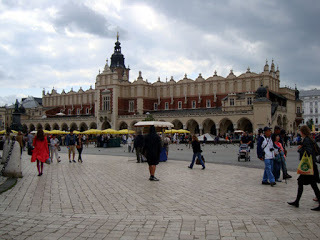 Cracow centre
Cracow centre
We drove up to Milan in the early hours of the morning and flew Ryan Air to Cracow. Bit of a shock to find the temperature at 15 degrees, windy and damp! We just had time to take the shuttle train into town for lunch. Neil and I both ordered something in Polish (of which we understand not a word) and enough pork and pickled cabbage arrived to feed a small third world country. Incredibly cheap, but it was not a sight for vegetarians! From the menu and the amount of meat and beer being consumed around us, I'm amazed there's a single Polish male still alive over the age of 54. My cholesterol doubled just looking at it. Unfortunately the photos came out blurred (camera jetlag?).
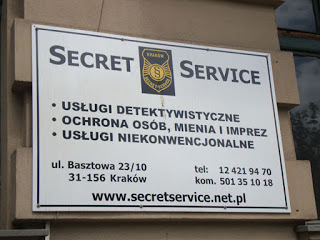
We avoided the secret services,
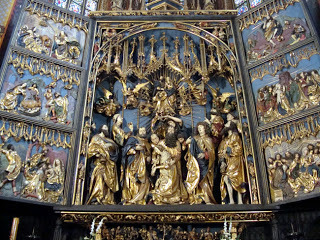
and just had time to have a quick peek inside St Marys, at the beautiful and gigantic medieval altar screen carved by Veit Stoss, before heading back to the airport to pick up the coach over the border into Slovakia.
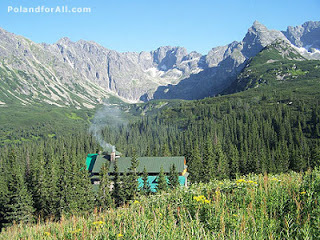
This was a three hour trip through the Tetra mountains (photo courtesy of Polish tourism) to Ruzomberok, 1500 feet up in the air, surrounded by hills and pine forests. It was very dark by the time we arrived. We're staying in a ski lodge (a bit like a big youth hostel for grown ups) in the middle of a spooky wood that would be perfect for the setting of a Dracula movie. Arrived too late for dinner, so had to make do with crisps, a sticky chocolate and honey cake, wine and beer, which was all that was behind the counter at reception. Delegates from almost every country you can mention - America, New Zealand, Poland, Germany, Russia, Italy, France, Ireland, Japan - we're a fantastic mixture. This is going to be fun!
 Cracow centre
Cracow centreWe drove up to Milan in the early hours of the morning and flew Ryan Air to Cracow. Bit of a shock to find the temperature at 15 degrees, windy and damp! We just had time to take the shuttle train into town for lunch. Neil and I both ordered something in Polish (of which we understand not a word) and enough pork and pickled cabbage arrived to feed a small third world country. Incredibly cheap, but it was not a sight for vegetarians! From the menu and the amount of meat and beer being consumed around us, I'm amazed there's a single Polish male still alive over the age of 54. My cholesterol doubled just looking at it. Unfortunately the photos came out blurred (camera jetlag?).

We avoided the secret services,

and just had time to have a quick peek inside St Marys, at the beautiful and gigantic medieval altar screen carved by Veit Stoss, before heading back to the airport to pick up the coach over the border into Slovakia.

This was a three hour trip through the Tetra mountains (photo courtesy of Polish tourism) to Ruzomberok, 1500 feet up in the air, surrounded by hills and pine forests. It was very dark by the time we arrived. We're staying in a ski lodge (a bit like a big youth hostel for grown ups) in the middle of a spooky wood that would be perfect for the setting of a Dracula movie. Arrived too late for dinner, so had to make do with crisps, a sticky chocolate and honey cake, wine and beer, which was all that was behind the counter at reception. Delegates from almost every country you can mention - America, New Zealand, Poland, Germany, Russia, Italy, France, Ireland, Japan - we're a fantastic mixture. This is going to be fun!
Published on June 27, 2012 11:46



